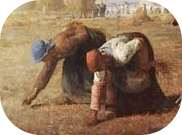
This psalm was, no doubt, written by David during one of those times when he had been driven to the mountains and so, away from the Holy Tabernacle and the things of his God. This is what caused his heart to be “overwhelmed.” “To be absent from the place of divine worship was a sore sorrow to saints in the olden times; they looked upon the tabernacle as the centre of the world, and they counted themselves to be at the fag–end of the universe when they could no longer resort to the sacred shrine.” (Spurgeon.) Being in this position, David does the only thing possible and cries unto the Lord to be led to that Rock and strong tower where he can be sustained until that day, when in God–s mercy, he can return and “perform” his “vows” in the courts of God–s house again. (Verse 8)
Verse 1. “Hear my cry, O God …” There is in this expression an endeavour to approach unto God; as you do when you cry after one whom you see at a distance, and are afraid will go farther away. It is the great work of faith to cry out after God when you see Him to be at a distance, lest at the next turn He should be quite out of sight. Crying to the Lord supposes Him to be withdrawing or departing.
John Owen
Verses 2–3. “From the end of the earth will I cry unto thee … for thou has been a shelter …” 1. How would he pray? “I will cry unto thee”. 2. Where would he pray? “From the ends of the earth.” 3. When would he pray? “When my heart is overwhelmed.” 4. For what would he pray? “Lead me to the rock that is higher than I.” 5. Whence does he derive his encouragement to pray? “For thou hast been a shelter for me …”
William Jay
Verse 2. “Lead me to the rock that is higher than I.” Like a man shipwrecked at sea, David sees the rock of his refuge rising out of the stormy waters and pleads with the Lord that he might be taken and placed upon its safe summit. The Rock is Christ, and so often, the child of God, having found himself floundering in a storm where his own high notions have cast him, can only turn and look to that Rock that is “higher” than all his own notions and far above any of his own thoughts. At such a time he sees his utter dependence upon the sovereign will and purpose of His God in heaven; for although he may see Christ as the Rock of his refuge he has no creature–power to strike out for that Rock. So, the prayer: “lead me,” says David. He can–t go of himself: “Lead me to the rock that is higher than I.” Then God is glorified in our complete reliance upon Him. Not only must He give us that Rock of Refuge in Christ His Son, but He, by His Holy Spirit, must lead us to it in the midst of the storm. This is one of the blessings of “Father, Son, and Holy Spirit,” to our hearts.
Verse 4. “I will abide in thy tabernacle …” In Christ, this is the place where the priest had presented the sacrifice; where the law is laid up in the ark as fulfilled; where the light of the Spirit–s candlestick shines; where the manna abides; where the glory is above the mercy–seat; where no enemy can enter; where I commune with a Covenant God.
Hints to the Village Preacher
Verse 5. “For thou, O God, hast heard my vows …” That prayer is a blank which has no vow in it. Is it a mercy thou prayest Him to give? If it is, then, thou wilt praise Him for it, and serve Him with it. It is a sin thou prayest against? Except thou jugglest with God, thou wilt vow against it as well as pray against it.
William Gurnall
Verse 7. “He shall abide before God for ever …” Though this is true of David in a modified sense, we prefer to view the Lord Jesus as here intended as the lineal descendant of David, and the representative of His royal race. Jesus is enthroned before God to eternity; here is our safety, dignity, and delight. We reign in Him; in Him we are made to sit together in the heavenlies. David–s personal claim to sit enthroned for ever is but a foreshadowing of the revealed privilege of all true believers.
Charles Haddon Spurgeon
Verse 8. “So will I sing praise unto thy name for ever …” They that are Godly are oppressed and vexed in the church or congregation for this reason: that when they are pressed, they should cry; and when they cry that they should be heard; and when they are heard that they should laud and praise God.
Augustine
| This Page Title – Gleanings in the Psalms – Psalm 61 The Wicket Gate Magazine "A Continuing Witness". Internet Edition number 102 – placed on line May 2013 Magazine web address – www.wicketgate.co.uk |